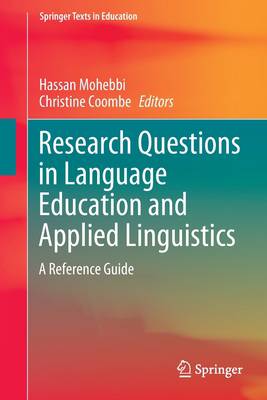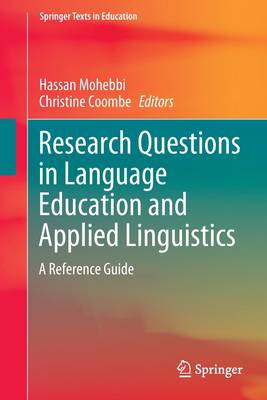
- Retrait gratuit dans votre magasin Club
- 7.000.000 titres dans notre catalogue
- Payer en toute sécurité
- Toujours un magasin près de chez vous
- Retrait gratuit dans votre magasin Club
- 7.000.000 titres dans notre catalogue
- Payer en toute sécurité
- Toujours un magasin près de chez vous
Research Questions in Language Education and Applied Linguistics
A Reference Guide
Description
This volume encompasses the range of research questions on language-related problems that arise in language teaching, learning and assessment. The [150] chapters are written by experts in the field who each offer their insights into current and future directions of research, and who suggest several highly relevant research questions.
Topics include, but are not limited to: language skills teaching, language skills assessment and testing, measurement, feedback, discourse analysis, pragmatics, semantics, language learning through technology, CALL, MALL, ESP, EAP, ERPP, TBLT, materials development, genre analysis, needs analysis, corpus, content-based language teaching, language teaching and learning strategies, individual differences, research methods, classroom research, form-focusedinstruction, age effects, literacy, proficiency, and teacher education and teacher development. The book serves as a reference and offers inspiration to researchers and students in language education.An important skill in reviewing the research literature is following a study's "plan of attack." Broadly, this means that before accepting and acting upon the findings, one considers a) the research question (Is it clear and focused? Measurable?), b) the subjects examined, the methods deployed, and the measures chosen (Do they fit the study's goal and have the potential to yield useful results?), and c) the analysis of the data (Do the data lead to the discussion presented? Has the author reasonably interpreted results to reach the conclusion?). Mohebbi and Coombe's book, Research Questions in Language Education and Applied Linguistics: A Reference Guide, helps budding researchers take the first step and develop a solid research question. As the field of language education evolves, we need continual research to improve our instructional and assessment practices and our understanding of the learners' language learning processes. This book with its remarkable 150 topics and 10 times the number of potential research questions provides a wealth of ideas that will help early career researchers conduct studies that move our field forward and grow our knowledge base. Deborah J. Short, Ph.D., Director, Academic Language Research & Training, Past President, TESOL International Association (2021-22)
As a teacher in graduate programs in TESOL I frequently come across the frustration of students at centering their research interests on a particular topic and developing research questions which are worth pursuing so as to make a contribution to the field. This frustration stems from the fact that our field is so vast and interrelated, that it is often impossible to properly address all that interests them. Hence, I wholeheartedly welcome this most relevant and innovative addition to the research literature in the field of TESOL and Applied Linguistics. Coombe and Mohebbi have created a real tour de force that stands to inform budding researchers in the field for many years to come. Additionally, the cutting-edge depiction of the field and all it has to offer will no doubt update the research agendas of many seasoned researchers around the world. The 150 chapters are organized in a most powerful, yet, deceptively simple way offering a positioning within the topic, suggesting questions that might direct inquiry and offering a basic set of bibliographic tools to start the reader in the path towards research. What is more, the nine sections in which the chapters are organized leave no area of the field unexplored. Dr. Gabriel Díaz Maggioli, Academic Advisor, Institute of Education, Universidad ORT del Uruguay, President, IATEFL
Chapter "Metacognition in Academic Writing: Learning Dimensions" is available open access under a Creative Commons Attribution 4.0 International License via link.springer.com.
Spécifications
Parties prenantes
- Editeur:
Contenu
- Nombre de pages :
- 889
- Langue:
- Anglais
- Collection :
Caractéristiques
- EAN:
- 9783030791421
- Date de parution :
- 14-01-22
- Format:
- Livre broché
- Format numérique:
- Trade paperback (VS)
- Dimensions :
- 156 mm x 234 mm
- Poids :
- 1260 g






